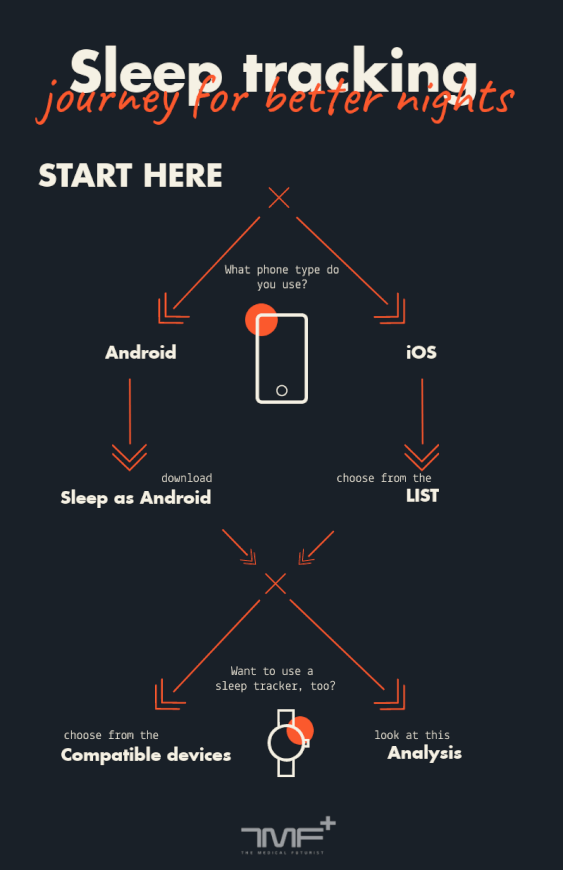Sleep Trackers for Sleep Quality—do they really help you sleep better? Or are they just another gadget? More people are using tech to improve their sleep. But can a sleep tracker really show how well you sleep?
Yes, and with surprising accuracy. Devices like the Oura Ring, Fitbit Sense, and Apple Watch track sleep stages and heart rate. This article looks at the top sleep trackers, their accuracy, and what to consider when choosing one.
Dr. Matthew Walker, author of Why We Sleep, says quality sleep boosts focus, immunity, and longevity. Want to find a sleep tracker that matches science? Keep reading—your best night’s sleep might be just a few lines away.
Introduction To Sleep Trackers
Sleep is vital for good health. Sleep trackers can help you monitor your sleep quality. They use technology to provide insights into your sleep patterns.
Importance Of Sleep
Good sleep is essential for physical and mental health. It helps your body repair and recharge. Poor sleep can lead to health problems. These include obesity, heart disease, and diabetes.
Children need more sleep for growth and learning. Adults need sleep to function well during the day. Quality sleep can improve mood and memory.
Here are some benefits of good sleep:
- Boosts the immune system
- Enhances mood and mental health
- Improves concentration and productivity
- Helps maintain a healthy weight
Role Of Technology
Technology can help you monitor and improve sleep. Sleep trackers are wearable devices. They can be worn on the wrist or placed under the mattress.
These devices track various data points:
| Data Point | Description |
|---|---|
| Heart Rate | Monitors your heart rate during sleep. |
| Sleep Stages | Identifies light, deep, and REM sleep stages. |
| Movement | Tracks how much you move during sleep. |
| Breathing | Monitors your breathing patterns. |
Sleep trackers often come with apps. These apps provide detailed reports. They offer tips to improve sleep quality.
Here are some common features of sleep tracker apps:
- Sleep score
- Personalized sleep tips
- Graphs of sleep patterns
- Wake-up alarms
Using sleep trackers can help you understand your sleep. They can guide you to better sleep habits. Technology makes it easier to get the rest you need.

Credit: medicalfuturist.com
Types Of Sleep Trackers
Understanding the types of sleep trackers can help improve sleep quality. There are various options available, each offering unique features and benefits. This section will explore the two main categories: wearable devices and non-wearable options.
Wearable Devices
Wearable devices are popular for tracking sleep. They are easy to use and provide accurate data. These devices can be worn on the wrist, finger, or even as a headband.
- Smartwatches: These are multi-functional devices that track sleep, heart rate, and activity. They are worn on the wrist and sync with your smartphone.
- Fitness Bands: Similar to smartwatches but often more affordable. They focus on tracking physical activity and sleep patterns.
- Ring Trackers: These are worn on the finger and are less intrusive. They offer detailed insights into your sleep cycles.
- Headbands: These devices are worn on the head. They monitor brain activity to provide accurate sleep data.
Non-wearable Options
Non-wearable options are ideal for those who dislike wearing devices to bed. These options can be placed near or under your sleeping area.
- Bedside Monitors: These devices sit on your nightstand. They use sensors to monitor breathing and movement.
- Under-Mattress Sensors: Placed under your mattress, they track sleep without any physical contact. They can monitor heart rate, breathing, and movement.
- Smart Mattresses: These mattresses come with built-in sensors. They provide comprehensive sleep data and adjust firmness for better sleep.
- Room Sensors: These devices monitor the environment, such as temperature and noise. They provide insights on how room conditions affect your sleep.
| Type | Example Devices | Key Features |
|---|---|---|
| Wearable | Smartwatches, Fitness Bands, Ring Trackers, Headbands | Multi-functional, tracks activity, heart rate, and sleep |
| Non-Wearable | Bedside Monitors, Under-Mattress Sensors, Smart Mattresses, Room Sensors | Non-intrusive, environment monitoring, detailed sleep data |
Choosing the right sleep tracker depends on personal preferences. Wearable devices offer convenience and multifunctionality. Non-wearable options provide comfort and detailed insights.
Key Features To Consider
When selecting a sleep tracker, it’s crucial to focus on certain key features. These features ensure you get the most accurate and comfortable experience. Let’s explore the essential aspects you need to consider.
Accuracy
Accuracy is vital for monitoring your sleep quality. A reliable sleep tracker should provide precise data. This includes information about sleep stages, heart rate, and movement.
Look for devices that use multiple sensors. These sensors enhance the accuracy of the data collected. Also, check for feedback from other users about the device’s performance.
Here’s a quick look at some accuracy features:
| Feature | Description |
|---|---|
| Heart Rate Monitor | Tracks your heart rate throughout the night. |
| Movement Sensors | Detects your body movements during sleep. |
| Sleep Stage Analysis | Identifies light, deep, and REM sleep stages. |
Comfort
Comfort is another crucial factor. You wear a sleep tracker all night. It should not cause any discomfort or irritation.
Consider the material of the device. Soft, breathable materials are ideal. The design should be lightweight and not too bulky.
Check out these comfort-related features:
- Soft wristbands
- Adjustable straps
- Lightweight design
- Non-intrusive sensors
Battery Life
Battery life is important for uninterrupted tracking. A sleep tracker with long battery life ensures continuous monitoring without frequent recharges.
Look for devices with at least 7 days of battery life. This duration covers a whole week without needing a recharge.
Consider these battery life features:
- Long-lasting battery (7+ days)
- Quick recharge times
- Battery-saving modes
Invest in a sleep tracker that balances accuracy, comfort, and battery life. This ensures you get the best insights into your sleep quality.
How Sleep Trackers Work
Sleep trackers are popular tools for improving sleep quality. They help you understand your sleep patterns. But how do these devices work? Let’s break it down.
Sensors And Data Collection
Sleep trackers use various sensors to gather data. These sensors monitor your body movements, heart rate, and breathing patterns. Common sensors include accelerometers, gyroscopes, and optical heart rate monitors.
Accelerometers measure your movements during sleep. They help identify periods of restlessness. Gyroscopes track your body’s orientation and position. Optical heart rate monitors use light to measure your pulse.
Data collection is continuous throughout the night. The device records every movement, heartbeat, and breath. This raw data is then processed to understand your sleep behavior.
Analyzing Sleep Patterns
Once the data is collected, sleep trackers analyze your sleep patterns. This analysis includes identifying different sleep stages. The main sleep stages are light sleep, deep sleep, and REM sleep.
Light sleep is a transition phase between wakefulness and sleep. Deep sleep is the restorative phase, crucial for physical recovery. REM sleep is associated with dreaming and cognitive functions.
The tracker uses algorithms to classify these stages. It considers the duration and quality of each stage. This analysis helps create a comprehensive sleep report.
| Sleep Stage | Characteristics |
|---|---|
| Light Sleep | Transition phase, easy to wake up |
| Deep Sleep | Restorative, physical recovery |
| REM Sleep | Dreaming, cognitive functions |
With this information, you can better understand your sleep quality. Sleep trackers can also provide personalized tips. These tips help improve your sleep habits.
Benefits Of Using Sleep Trackers
Sleep trackers have become essential gadgets for many people. They offer valuable insights into your sleep patterns. These devices can help you improve your sleep quality and overall health.
Improved Sleep Quality
Using a sleep tracker can significantly improve sleep quality. These devices monitor your sleep stages and cycles. They help you understand your sleep patterns better. With this information, you can make necessary adjustments to your bedtime routine.
Many sleep trackers offer features like sleep scores and sleep coaching. These tools provide actionable tips to enhance your sleep. For instance, some trackers suggest optimal sleeping and waking times. This can help you feel more refreshed and energized.
Personalized Insights
Sleep trackers provide personalized insights based on your sleep data. They analyze your sleep habits and offer tailored advice. This helps you identify specific issues affecting your sleep quality.
Some trackers even offer customized recommendations for improving sleep. These might include changes to your sleep environment or habits. For example, you might get suggestions to adjust room temperature or reduce screen time before bed.
Here is a summary of the benefits in table format:
| Benefit | Description |
|---|---|
| Improved Sleep Quality | Monitors sleep stages and cycles, provides sleep scores and coaching. |
| Personalized Insights | Offers tailored advice and recommendations based on sleep data. |

Credit: www.nytimes.com
Limitations And Challenges
While sleep trackers promise better sleep insights, they come with limitations and challenges. These devices can sometimes be inaccurate and raise privacy concerns. Understanding these issues helps you make an informed decision.
Potential Inaccuracies
Sleep trackers are not always accurate. They rely on sensors and algorithms. These can misinterpret your movements and heart rate. For example, restless leg movements might be seen as being awake. This leads to false data.
Moreover, different brands have varying levels of precision. Some may offer more reliable data than others. Here’s a comparison table:
| Brand & Model | Accuracy Level |
| Oura Ring Gen 3 | High |
| Fitbit Sense 2 | High |
| Apple Watch Series 8 | Medium-High |
| Samsung Galaxy Watch 5 | Medium |
| Garmin Vivosmart 4 | Medium |
| Xiaomi Mi Band 5 | Low-Medium |
| Withings Sleep Tracking Mat | Medium |
Privacy Concerns
Sleep trackers collect personal data. This includes sleep patterns and health metrics. Storing and sharing such data poses privacy risks. Unauthorized access can lead to misuse of your information.
Here are some key privacy concerns:
- Data breaches
- Unauthorized data sharing
- Inadequate encryption methods
Always check the privacy policy of your sleep tracker. Ensure they follow strict data protection protocols.
Top Sleep Trackers On The Market
Sleep trackers have revolutionized how we understand our sleep patterns. They help improve sleep quality by monitoring different aspects of sleep. This section will explore the top sleep trackers on the market.
Popular Brands
Several brands stand out in the sleep tracker industry. These brands offer advanced features and reliable data.
- Fitbit (e.g., Fitbit Sense 2, Fitbit Charge 6):
Renowned for reliable sleep stage tracking (light, deep, REM) and user-friendly sleep scores. Newer models also track skin temperature and heart rate variability (HRV). - Garmin (e.g., Venu 3, Forerunner 265):
Offers advanced sleep tracking with integrated pulse oximetry and Body Battery™ energy monitoring. Excellent for athletes and fitness-focused users. - Withings (e.g., Withings Sleep Analyzer):
A non-wearable mat that detects snoring, breathing disturbances, and provides a nightly sleep score. Ideal for users who prefer no wrist device. - Oura Ring (Generation 3):
A discreet and lightweight ring that tracks sleep stages, readiness, HRV, and body temperature trends. Highly praised for its comfort and long battery life.
User Reviews
Users share their experiences to help others choose the best sleep tracker.
| Brand | User Rating | Key Features |
|---|---|---|
| Fitbit | 4.5/5 | Accurate data, easy to use, detailed sleep stages |
| Garmin | 4.3/5 | Comprehensive health insights, pulse oximetry |
| Withings | 4.2/5 | Snore detection, sleep score |
| Oura Ring | 4.6/5 | Comfortable, detailed recovery insights |
Fitbit users appreciate its accuracy and ease of use. Garmin users value its detailed health insights. Withings users like the snore detection feature. Oura Ring users love its comfort and recovery insights.
Maximizing Your Sleep Tracker
Sleep trackers can help you understand your sleep patterns. To get the most out of your device, you need to know how to use it effectively. This guide will show you how to set goals and interpret data for better sleep.
Setting Goals
Setting goals is the first step in using your sleep tracker. Start by deciding how much sleep you need each night. Most adults need 7-9 hours of sleep.
Create a bedtime routine that helps you relax. Make sure to go to bed and wake up at the same time every day.
Use your sleep tracker to set nightly goals. Monitor your progress and adjust your routine as needed.
Interpreting Data
Interpreting data from your sleep tracker is essential. Look at the data each morning to see how well you slept. Pay attention to the amount of deep sleep, light sleep, and REM sleep you get.
Use the data to identify patterns. For example, you might notice you sleep better on nights when you read before bed.
Your sleep tracker may also show how many times you wake up during the night. Use this information to make changes to your sleep environment. Try adjusting your mattress, pillows, or room temperature.
| Data Metric | Ideal Range | Actionable Tips |
|---|---|---|
| Deep Sleep | 1.5-2 hours | Reduce screen time before bed |
| Light Sleep | 4-5 hours | Keep a consistent sleep schedule |
| REM Sleep | 1-1.5 hours | Manage stress levels |
| Awake Time | Less than 30 minutes | Improve sleep environment |
- Deep Sleep: Important for body restoration
- Light Sleep: Helps with memory and learning
- REM Sleep: Crucial for mood regulation
- Awake Time: Minimizing it helps with overall restfulness
Future Of Sleep Tracking Technology
The future of sleep tracking technology is bright and promising. Emerging innovations will change how we monitor and improve sleep quality. From advanced sensors to AI integration, the next generation of sleep trackers will be more accurate and user-friendly.
Upcoming Innovations
Several upcoming innovations will revolutionize sleep tracking technology:
- Advanced Sensors: New sensors will measure more than just movement and heart rate. They will track breathing patterns, oxygen levels, and even brain waves.
- AI Integration: Artificial intelligence will analyze sleep data more efficiently. It will provide personalized insights and recommendations.
- Wearable Comfort: Future sleep trackers will be more comfortable. They will be designed to be worn seamlessly throughout the night.
- Smart Home Integration: Sleep trackers will integrate with smart home devices. This will allow for automatic adjustments to lighting, temperature, and sound to enhance sleep quality.
Potential Impact On Health
The potential impact of these innovations on health is significant:
- Better Sleep Quality: Improved tracking will help identify sleep issues. This will lead to better sleep quality and overall health.
- Early Detection of Disorders: Advanced sensors will help detect sleep disorders early. Early detection will lead to timely treatment and better health outcomes.
- Personalized Sleep Plans: AI will create personalized sleep plans. These plans will be based on individual sleep data, leading to better results.
- Integrated Health Monitoring: Sleep trackers will work with other health devices. This integration will provide a comprehensive view of health and wellness.
In summary, the future of sleep tracking technology is exciting. Upcoming innovations and their potential health impacts will make a significant difference in improving sleep quality and overall health.

Credit: www.tempurpedic.com
Frequently Asked Questions
How Can I Track The Quality Of My Sleep?
You can track sleep quality using apps, wearable devices, or sleep diaries. These tools monitor sleep patterns, duration, and disturbances.
Which Is The Most Accurate Sleep Tracker?
The most accurate sleep tracker is the Oura Ring. It combines advanced sensors with a comfortable design for precise sleep monitoring.
Is There An App That Tracks the Quality Of Sleep?
Yes, several apps track sleep quality, including Sleep Cycle, Fitbit, and Pillow. These apps monitor sleep patterns and provide insights.
How Accurate Are Sleep Trackers For Deep Sleep?
Sleep trackers can estimate deep sleep, but their accuracy varies. They often use heart rate and movement data. Consult a sleep specialist for precise analysis.
Conclusion
Sleep trackers offer valuable insights for improving sleep quality. They help monitor patterns, identify issues, and enhance overall health. By integrating these tools, individuals can achieve better rest and well-being. Embrace technology to optimize sleep and enjoy the benefits of a rejuvenated life.
Prioritize sleep and witness transformative changes.

A passionate tech blogger and the founder of Best Tech View, a dynamic platform dedicated to all things technology. With a keen interest in the tech, Ahmad strives to provide insightful and engaging content on the latest tech trends, and breakthroughs.
